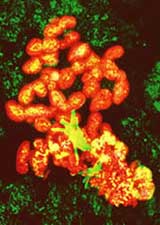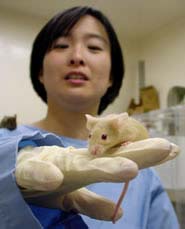
A new type of Earth ecosystem could be found on other planets.
Scientists have found a community of microbes unlike anything else on Earth. Conditions in this ecosystem could mimic those on Earth when life began, and might exist elsewhere in today’s Solar System.
Home to the microbes is a hot spring 200 metres beneath the US state of Idaho. Their lives owe nothing to the Sun. They generate energy by combining hydrogen from rocks with carbon dioxide, releasing methane as a by

Natural randomness punctuated past ice ages with warm spells.
Natural randomness in the world’s climate system may have caused the frequent, fast and fleeting returns to warm conditions during past ice ages, say two German scientists 1 .
Andrey Ganopolski and Stefan Rahmstorf at the Potsdam Institute for Climate Impact Research think that the flickering character of ice-age climate is a signature of stochastic resonance. This is the counter-intuitive phenome
In the first weeks of the New Year a team of European scientists drilled successfully through 2002 metres of ice at Dome Concordia, high on East Antarctica`s plateau – one of the most hostile places on the planet. A specially created laboratory on the ice enabled scientists to analyse, for the first time, past climate shifts within hours of each 3 m length of core being drilled – rather than waiting months or years for detailed study back in European labs. The team, working on a seven-year Antarctic
Radiologists in Nottingham have discovered a fast and accurate technique to diagnose deep vein thrombosis (DVT), which may be particularly helpful to pregnant women and travellers at risk of developing dangerous blood clots.
In a study funded by the British Heart Foundation and published this week in the American journal, the Annals of Internal Medicine, (15 January 2002, volume 136, number 2) Professor Alan Moody and his team in the department of academic radiology at the University of Nott

Missing protein leaves mice impervious to pain
Researchers have a new lead for treating pain. A protein called DREAM appears to play a key role in how mice respond to heat, touch and inflammation 1 .
Mice lacking DREAM seem oblivious to all types of pain, find Josef Penninger and his colleagues at The AMGEN Institute, Toronto, Canada. The animals can bear acute pain – the kind caused for example by heat, pressure, or injections as well as chronic inflammatory
One way to make aeroplanes fly more efficiently is to drill millions of tiny holes in the leading edges of the wings. Like the dimples on a golf ball this has the effect of reducing drag. However, producing these holes on a manufacturing scale is not yet commercially feasible.
Researchers at Heriot-Watt University, funded by the Engineering and Physical Sciences Research Council, and the aerospace company BAE SYSTEMS, have carried out a series of fundamental studies on drilling such holes